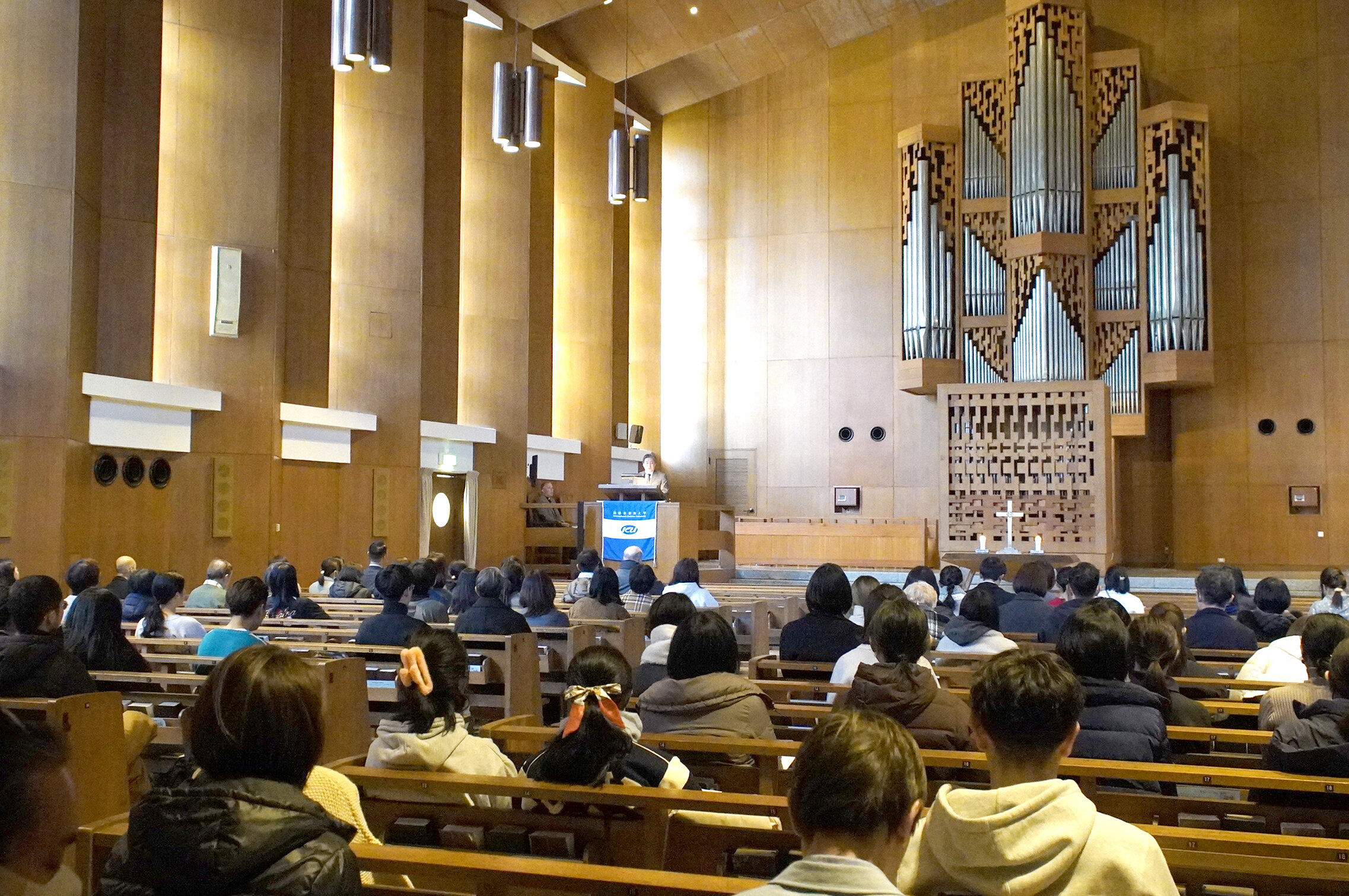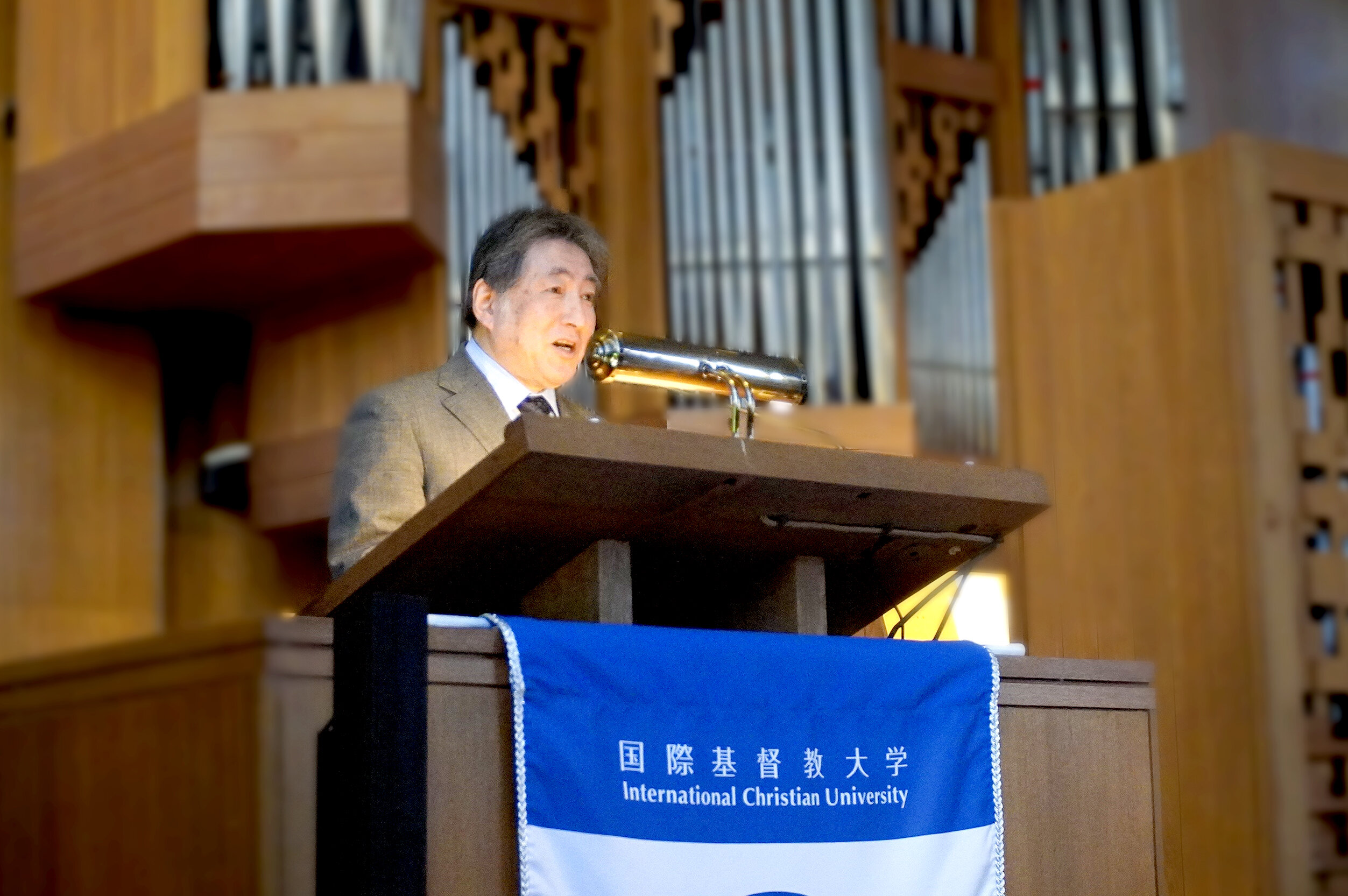NEWS
2025 New Year Chapel Hour
Update: January 9, 2025

The 2025 New Year Chapel Hour was held at the university chapel on Wednesday, January 8, 2025.
The service, presided by Professor Jeremiah Alberg, Acting Director of Religious Center, began with the hymn "Lord of All Being" by all those in attendance, and continued with a Scripture Reading of Romans 5:1-5.
Following this, President Shoichiro Iwakiri delivered his message.
Full text of President Iwakiri's message is below.
===

Happy New Year to everyone.
In December 2024, news broke of the fall of the Assad regime in Syria.
In 2017, ICU, in collaboration with JICUF, established the Syrian Scholars Initiative to provide scholarships to Syrian student refugees fleeing their war-torn homeland, accepting them as four-year regular students starting in 2018.
Syria had been ravaged by civil war for approximately 14 years since the Arab Spring in 2011. Many civilians opposing President Assad's dictatorship lost their lives or fled abroad as refugees. At present, I envision the people of Syria fervently yearning to restore peace to their devastated homeland. Given the multitude of parties opposing the Assad regime, each with distinct standpoints, the journey for all Syrians to embrace a liberal and peaceful life may be fraught with challenges and require considerable time. Nonetheless, I know that a flame of hope has been ignited in a Syrian student at ICU, dedicated to rebuilding the homeland, while experiencing a profound sense of freedom. Other Syrian students at ICU likely share similar sentiments. I sincerely hope their studies at ICU will empower them to fulfill their aspirations.
Devastation and tragic violence persist in Ukraine and Gaza, with no end in sight. In Pantagruel, French 16th-century Renaissance author François Rabelais speaks through a character who declares, 'All instruments of war are instigated by the devil.' (English translation by Sir Thomas Urquhart and Peter Anthony Motteux). Weapons and artillery, augmented by technological advancements, are claiming countless lives across various regions worldwide.
How can we kindle a beacon of hope amidst the profound tragedies unfolding in our increasingly destructive world, even as progress in science and technology continues to make our lives more convenient?
In 2017, while fulfilling my teaching duties, I crafted a collection of poems, entitled On Hope in the Form of a Samara. The book includes an eponymous poem, which I would like to recite today as a personal message.
A samara is a seed found in trees like the maple. The small, dry, flat seed is encased in a feathery, winged structure that aids in wind dispersal, allowing it to twirl and travel far from the parent tree.
In the opening of the poem, each couplet alternates between portraying a life of peace and one shattered by war.
On hope in the form of a samara
Dining unarmed in peace
Daily toil entwined with serene release
Oppressed and famished
In constant fear of being vanished
Setting sail with dishes tinkling, curtains and bags rustling,
gentle waves lapping
Skull-emblazoned windows, bewildered teddy bears,
hanging cords, fetid rugs
Unwinding yarn to knit anew
Quivering in tattered rags
Proceeding from stranded light
to a gentle glow
Dry and flat
Shrouded in a veil of tears
By 2017, Palestinians had long been displaced from their land and subjected to armed violence. In Ukraine, Russia had annexed the Crimean Peninsula, and the Eastern region had been targeted by attacks. Meanwhile, Syria was ravaged by civil war, with documentary footage from that time capturing the harrowing transformation of innocent, soccer-loving boys growing up to take arms against the dictatorship, only to eventually vanish. As I went about my daily life, I often pondered how people managed to sustain their hope, amidst the ruins or far away from the epicenter of the devastation. I supposed that when large-scale hope shatters, people gather its fragments and, without succumbing to despondence, sail on small boats of hope to navigate their lives. Though my distress would have been less severe than those facing political or armed violence, I found solace in reflecting on how I overcame it by holding on to glimmers of hope.
My poem depicts a dry, flat, teardrop-shaped samara cradling the seed of life. It soars far and wide, destined to grow into a magnificent maple tree.
These days, as the light falters, my thoughts find a way to create a more resilient glow, without yielding to a dimmer one. Perhaps I have changed over the past seven years.
What will the year 2025 be like? Can the cherished ideals of freedom, equity, and democracy endure in a wholesome manner? Will smiles, trust, and moments of happiness continue to grace our lives?
To preserve the values that make life worth living, we need love and dialogue, not hatred and conflict.
May the year 2025 be filled with love, dialogue and compassion.
